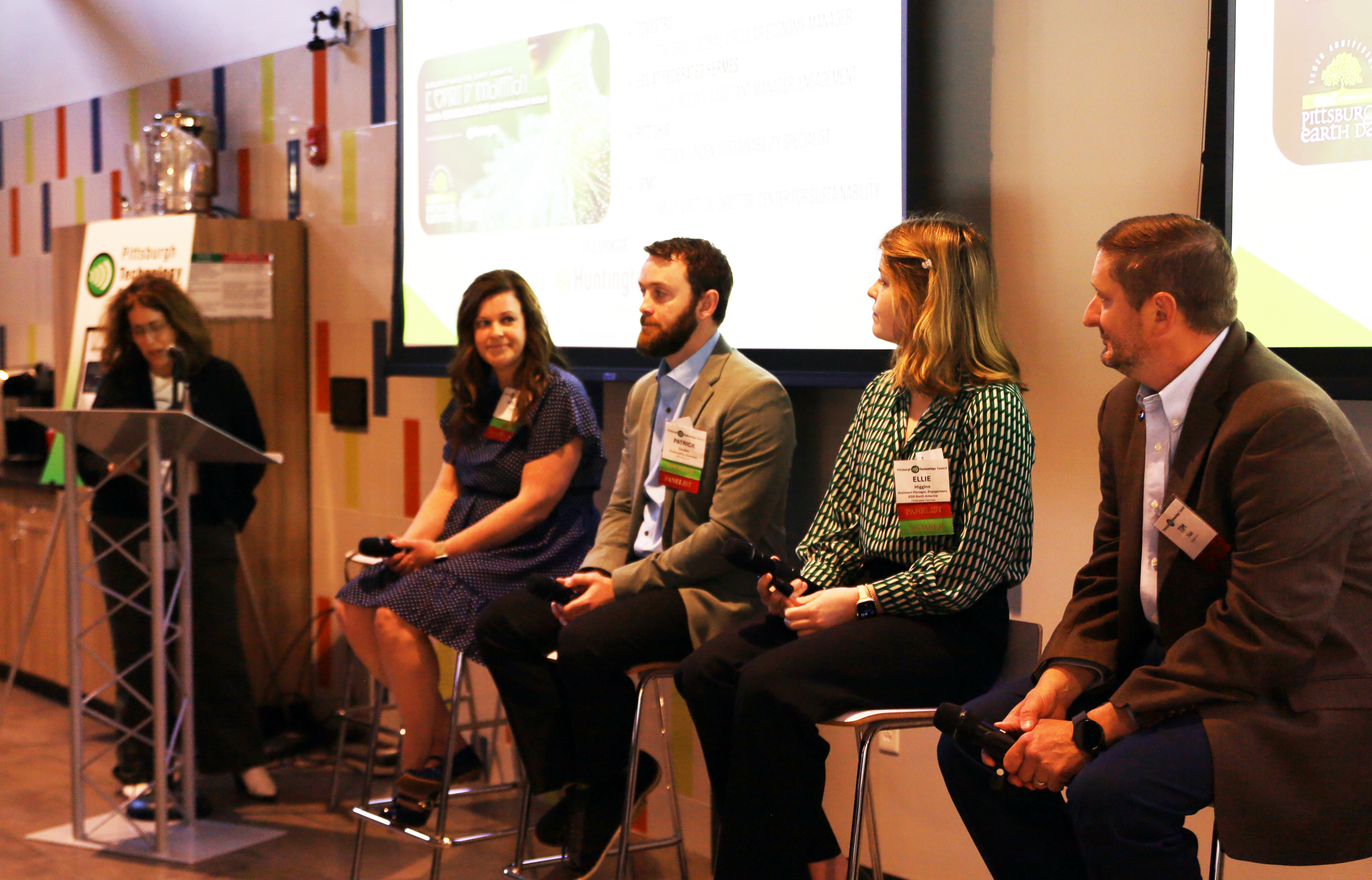Inspired by Ecolution Fashion Gala, Tech Council Hosts Huntington Bank Breakfast Briefing on Sustainability
By Sheena Carroll
On June 4, the Pittsburgh Technology Council hosted a special Huntington Bank Breakfast Briefing at the Robotics Factory in Lawrenceville, featuring speakers from sponsoring companies of the upcoming 10th Annual Ecolution Fashion Gala.
 The featured speakers – Tim Thiel (Global Circular Economy Manager at Covestro), Ellie Higgins (Assistant Manager, Engagement, EOS North America at Federated Hermes), Patrick Linden (Sustainability Specialist at PITT OHIO), and Holly Vogt (Sr. Director, Center for Sustainability at UPMC) – discussed in a panel moderated by Tech Council CEO Audrey Russo about their companies’ innovations in sustainability, leveraging new technologies, and engaging their workforce in their new eco-friendly initiatives.
The featured speakers – Tim Thiel (Global Circular Economy Manager at Covestro), Ellie Higgins (Assistant Manager, Engagement, EOS North America at Federated Hermes), Patrick Linden (Sustainability Specialist at PITT OHIO), and Holly Vogt (Sr. Director, Center for Sustainability at UPMC) – discussed in a panel moderated by Tech Council CEO Audrey Russo about their companies’ innovations in sustainability, leveraging new technologies, and engaging their workforce in their new eco-friendly initiatives.
Navigating Sustainability: Insights and Innovations from Industry Leaders
In an era where sustainability has become crucial for businesses across industries, leaders are stepping up to adopt innovative strategies that blend environmental responsibility with economic growth. In a recent discussion among industry experts, several key insights emerged, shedding light on both the challenges and opportunities present in the quest for a sustainable future.
Setting Meaningful Goals
Many organizations have set ambitious goals to reduce emissions, with some aiming for zero emissions by 2050. However, these goals often prompt questions about the feasibility of achieving them. A crucial takeaway is the importance of constructing a step-by-step plan rather than simply setting distant targets and figuring out how to get there later. This proactive approach ensures that everyone within the organization understands the path and their role in reaching these objectives.
Higgins suggested that organizations narrow their sustainability focuses on pursuing what makes most sense for them, while Vogt advised that anyone who wants to pitch new eco-friendly programs to their company be open-minded about any feedback they receive.
Engaging the Workforce
Internal buy-in is essential for driving sustainability throughout an organization. Companies have focused on educating their workforce about sustainability, ensuring that even those outside the core environmental teams comprehend key concepts. Workshops, training sessions, and rewards linked to sustainability performance are some methods that have proven effective in embedding sustainability into company culture.
Introducing sustainability metrics into financial incentives, such as linking emissions goals to employee bonuses, effectively aligns environmental and economic objectives. The integration of sustainability into business strategies requires a delicate balance, yet those who manage it well often find new avenues for innovation.
UPMC’s Center for Sustainability only opened 2 years ago, but has led to many organizational changes, ranging from consolidating trash bins in administrative spaces to developing new ways to reduce anesthetic gas waste from entering the atmosphere. Vogt said that listening and applying employee feedback about these things has increased support for sustainability programs at the organization.
Meanwhile, Thiel and Linden both cited financial incentives, such as including money saved from reduced energy use into employee bonuses.
Leveraging Technology
Technology plays a vital role in sustainability efforts. For instance, UPMC has implemented innovative gas waste management systems to reduce emissions, while PITT OHIO is experimenting with several forms of renewable natural gas. The adoption of new technologies often involves overcoming challenges, but the long-term benefits, both environmentally and financially, are significant.
The Role of Local Communities and Partnerships
There's a growing recognition that local businesses and community initiatives are pivotal in advancing sustainability. By fostering consumer empowerment and pushing for better recycling infrastructures, businesses can enhance their sustainability impact. Partnerships with community organizations also help amplify efforts, whether through tree-planting initiatives or bike safety programs.
“Shop local, think local,” said Linden. “Supporting the community is a form of sustainability.”
Thiel discussed the lack of and need for more regulatory infrastructure – especially when it comes to industrial-level recycling – and encouraged businesses to push for these changes.
Starting small and evolving is crucial for businesses new to sustainability. Initially, focusing on what matters most to the business and understanding the impacts of potential changes can guide the journey. Listening to stakeholders, from employees to customers, can also uncover opportunities for improvement.
A Future of Collaboration and Innovation
Despite the challenges, the drive towards sustainability remains strong, with many businesses exploring new technologies and innovative solutions. The intersection of creativity, sustainability, and technology is ripe with potential for transforming industries and communities alike.
As companies continue to pursue sustainability, they must remain adaptable and collaborative, learning from each other and fostering innovations that benefit both the planet and the bottom line. The journey is ongoing, but with informed leadership and collective efforts, a sustainable future is within reach.
The Ecolution Fashion Gala, produced by The Green Voice Collective, will be held on June 25 at the Carnegie Museum of Art. It will celebrate a decade of sustainable fashion and highlight eco-friendly designs created from recycled materials. The event promises to be a night of style and substance with a focus on a greener future.